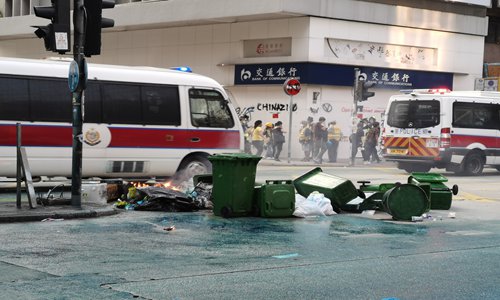Police apology accepted for accidental use of water cannons on HK mosque

HK police fire water cannons with blue water and tear gas to dispel protesters illegally assembled in Mong Kok on Sunday. Photo: Wang Cong/GT
Muslim leaders accepted the Hong Kong police's apology for spraying blue-dyed water on people and protesters standing outside the Kowloon Mosque on Sunday and confirmed they were not the intended target.
Joshua Wong, a Hong Kong separatist and activist in the illegal Occupy Central Movement in 2014, earlier had tweeted that the police intentionally attacked the mosque in the Tsim Sha Tsui area, in a move analysts said aimed to incite public discontent with the police.
But in a tweet on Monday, the Muslim Council of Hong Kong acknowledged the mosque was not the intended target of the police.
Hong Kong rioters have been trying to drag religion and race into their months-long protests across the city and should be denounced for this, observers said.
Police representatives went to the mosque Sunday night to show their concern over the incident, which the Muslim Council of Hong Kong said was "a noteworthy gesture."
On Monday morning, Hong Kong Chief Executive Carrie Lam Cheng Yuet-ngor and Commissioner of Hong Kong Police Force Stephen Lo Wai Chung, among other officials, visited the Kowloon Mosque and apologized for the incident.
Lam said the Muslim community has all along called Hong Kong their home, contributing to the city's society, which is pluralistic, inclusive, open and lives peacefully with other groups.
Commissioner Lo said that the Muslim community was peaceful and law-abiding and a close relationship has long been maintained between police and the mosque as well as the local Muslim community.
Police respect religious freedom and will spare no effort in protecting all religious premises, according to Lo.
Hong Kong Chief Imam Muhammad Arshad said he accepted the apology and believed there was a misunderstanding, according to some local media reports.
The cannon "accidentally affected the entrance and front gate" of the mosque, police explained.
Video images show the police in Hong Kong have exercised more restraint in tackling social unrest compared to the police in Spain and Chile.
Ethnic minority groups in Hong Kong are on alert after some South Asians were accused of being behind a bloody assault on Jimmy Sham Tsz-kit, convener of the Civil Human Rights Front, on Wednesday.
Protesters using social media networks such as Telegram and LIHKG called for actions targeting Chungking Mansions in Tsim Sha Tsui, a commercial and social hub for South Asians and Africans.
The Global Times reporter also saw they suggested firebombing the Kowloon Mosque on social media platform LIHKG.
This prompted some South Asians living in Hong Kong to give out bottles of water and other supplies to protesters outside Chungking Mansions on Sunday morning, in an apparent move to placate protesters so that they would not be attacked.
Arshad told the Global Times that the Muslim community decided to keep Kowloon Mosque closed on Sunday.
Qurrat-ul-ain, a Pakistani part-time assistant at a district council office, said that if someone from her community committed the attack, it would be a threat to all of the people.
"I felt a little scared though, thinking maybe if I go out, what will the protesters think of me or my friends?" Qurrat told the Global Times on Monday.
Kamal Paudyal, a Nepalese businessman and former vice chairman of the Nepal Chamber of Commerce Hong Kong, has been living in Hong Kong for 29 years.
He told the Global Times that South Asians usually haven't taken a stand in the protests and avoided going to protest sites.
He said rumors that South Asians were behind Sham's attack were not true and South Asians have become a target over the alleged involvement of South Asians in the Yuen Long attack on July 21, rumored to be connected to triad gangs.
Some online messages suggested members of the South Asian community were behind the attack and a group of Nepali men were confronted by locals and verbally abused and accused of attacking civilians.
"We are part of Hong Kong and we want peace," Paudyal said.